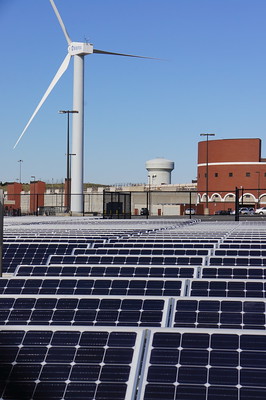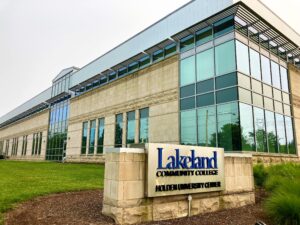Southeastern Michigan energy company DTE announced yesterday that it will take a coal-fired power plant in Monroe three years earlier than originally planned. In addition to the plant closure, DTE will also increase its investment in solar and wind energy. The shutdown will reduce DTE’s carbon emissions by 85%. The Monroe Power Plant will go offline in 2032, according to the company.
DTE plans to make $11 billion in solar and wind energy investments in Michigan in the next 10 years. The moves are also expected to enable the company to take advantage of tax breaks designed to encourage investments in alternative energy sources. Once the Monroe Power Plant closes, DTE will operate only one coal-fired power plant in the State of Michigan.
Closing the Monroe Power Plant is big news, since DTE generates 40% of its energy from Monroe and the other coal plant, the Belle River Plant in St. Clair County. To replace that capacity, by 2030, the company will construct solar and wind energy facilities that will generate 3,000 megawatts of power.
Eleven billion dollars is a big investment in solar and wind energy generation. Consumers Energy also says it plans to eliminate all its coal-burning plants by 2025 and will be able to produce 90% of its energy via clean sources by 2040.
This is the clearest indication yet that Michigan energy companies will need clean energy technicians in large numbers to turn these plans into reality in the next decade. Clean energy jobs represent an outstanding employment opportunity for trained technicians. Some community colleges in Michigan have already taken steps to create clean energy training programs, but that doesn’t mean WCC can’t join in.
Solar and wind energy jobs are WCC’s missed opportunity
This is one example of the high-wage, high-demand jobs WCC should be pursuing. Having these programs (and others like it) in the course catalog could be one step toward improving the value proposition of a two-year degree.
Relentless disinvestment in new high-wage, high-demand programs has severely limited the economic return on an associate degree. For some people, an associate degree is no longer a viable education option. The earnings differential between the average community college graduate and the average high school graduate is almost too small to be significant. While this may support the libertarian political ideals of certain individuals, it has literally ruined Michigan’s economy; made Michigan an unattractive place to live and work; eliminated the state as a potential place to locate new businesses, and contributed to the exodus of young, educated workers.
It is truly “time for a change.”
Photo Credit: Mike Steinhoff , via Flickr


















